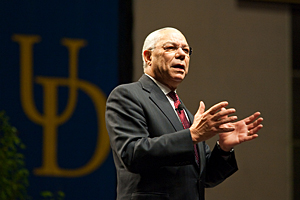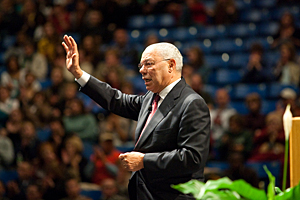

ADVERTISEMENT
- Rozovsky wins prestigious NSF Early Career Award
- UD students meet alumni, experience 'closing bell' at NYSE
- Newark Police seek assistance in identifying suspects in robbery
- Rivlin says bipartisan budget action, stronger budget rules key to reversing debt
- Stink bugs shouldn't pose problem until late summer
- Gao to honor Placido Domingo in Washington performance
- Adopt-A-Highway project keeps Lewes road clean
- WVUD's Radiothon fundraiser runs April 1-10
- W.D. Snodgrass Symposium to honor Pulitzer winner
- New guide helps cancer patients manage symptoms
- UD in the News, March 25, 2011
- For the Record, March 25, 2011
- Public opinion expert discusses world views of U.S. in Global Agenda series
- Congressional delegation, dean laud Center for Community Research and Service program
- Center for Political Communication sets symposium on politics, entertainment
- Students work to raise funds, awareness of domestic violence
- Equestrian team wins regional championship in Western riding
- Markell, Harker stress importance of agriculture to Delaware's economy
- Carol A. Ammon MBA Case Competition winners announced
- Prof presents blood-clotting studies at Gordon Research Conference
- Sexual Assault Awareness Month events, programs announced
- Stay connected with Sea Grant, CEOE e-newsletter
- A message to UD regarding the tragedy in Japan
- More News >>
- March 31-May 14: REP stages Neil Simon's 'The Good Doctor'
- April 2: Newark plans annual 'wine and dine'
- April 5: Expert perspective on U.S. health care
- April 5: Comedian Ace Guillen to visit Scrounge
- April 6, May 4: School of Nursing sponsors research lecture series
- April 6-May 4: Confucius Institute presents Chinese Film Series on Wednesdays
- April 6: IPCC's Pachauri to discuss sustainable development in DENIN Dialogue Series
- April 7: 'WVUDstock' radiothon concert announced
- April 8: English Language Institute presents 'Arts in Translation'
- April 9: Green and Healthy Living Expo planned at The Bob
- April 9: Center for Political Communication to host Onion editor
- April 10: Alumni Easter Egg-stravaganza planned
- April 11: CDS session to focus on visual assistive technologies
- April 12: T.J. Stiles to speak at UDLA annual dinner
- April 15, 16: Annual UD push lawnmower tune-up scheduled
- April 15, 16: Master Players series presents iMusic 4, China Magpie
- April 15, 16: Delaware Symphony, UD chorus to perform Mahler work
- April 18: Former NFL Coach Bill Cowher featured in UD Speaks
- April 21-24: Sesame Street Live brings Elmo and friends to The Bob
- April 30: Save the date for Ag Day 2011 at UD
- April 30: Symposium to consider 'Frontiers at the Chemistry-Biology Interface'
- April 30-May 1: Relay for Life set at Delaware Field House
- May 4: Delaware Membrane Protein Symposium announced
- May 5: Northwestern University's Leon Keer to deliver Kerr lecture
- May 7: Women's volleyball team to host second annual Spring Fling
- Through May 3: SPPA announces speakers for 10th annual lecture series
- Through May 4: Global Agenda sees U.S. through others' eyes; World Bank president to speak
- Through May 4: 'Research on Race, Ethnicity, Culture' topic of series
- Through May 9: Black American Studies announces lecture series
- Through May 11: 'Challenges in Jewish Culture' lecture series announced
- Through May 11: Area Studies research featured in speaker series
- Through June 5: 'Andy Warhol: Behind the Camera' on view in Old College Gallery
- Through July 15: 'Bodyscapes' on view at Mechanical Hall Gallery
- More What's Happening >>
- UD calendar >>
- Middle States evaluation team on campus April 5
- Phipps named HR Liaison of the Quarter
- Senior wins iPad for participating in assessment study
- April 19: Procurement Services schedules information sessions
- UD Bookstore announces spring break hours
- HealthyU Wellness Program encourages employees to 'Step into Spring'
- April 8-29: Faculty roundtable series considers student engagement
- GRE is changing; learn more at April 15 info session
- April 30: UD Evening with Blue Rocks set for employees
- Morris Library to be open 24/7 during final exams
- More Campus FYI >>
1:27 p.m., Nov. 4, 2009----Retired Gen. Colin Powell has compiled an impressive list of career achievements, one that rivals that of any living American as a four-star general, a two-time Presidential Medal of Freedom recipient and service as Secretary of State under President George W. Bush.
A remarkably candid and surprisingly funny Powell entertained a packed house of more than 4,000 at the Bob Carpenter Center on Tuesday night with his speech “Diplomacy: Persuasion, Trust and Values,” part of the University of Delaware's popular UD Speaks series.
Whether it was talking openly about life after stepping down as secretary of state or touching on current political topics, Powell blended lighthearted anecdotes about life without a personal jet with the serious subjects of health care, economics, education, the environment and terrorism.
Powell opened his speech by commending the University of Delaware. “I've had a wonderful time this afternoon, meeting students and spending an hour talking to very, very well informed students,” Powell said. “Looking around the campus, and I see an institution that is alive, thriving and doing such a great job of educating the next generation of America's leaders.”
After congratulating UD President Patrick Harker on the job he is doing, citing the University's Path to Prominence strategic plan and the UD Speaks program, Powell began his talk with several humorous stories about his transition to private life.
“One day, you're being besieged by every king, every president, every prime minister to go see them. One day you're the number one diplomat in the whole free world. One day you're the secretary of state of the United States of America,” Powell said, adding, “and the next day, you ain't.”
“The real problem,” Powell said, “is that a sort of emptiness comes upon you when the phones aren't ringing and people aren't shouting for you, and there's an intellectual and emotional gap that opens up inside. You can almost become depressed if you don't do something positive to fill that emptiness. So, after giving it a lot of thought, I found the perfect solution -- I bought a Corvette.”
After joking that the thing he misses most from his service as secretary of state is the personal airplane - “Condi took it and now Hillary has it” -- Powell spoke earnestly about education and the need for a strong public school system. He said the alarming number of students dropping out of school “is a problem for all of us.”
Powell said that he graduated high school with a 78 average and graduated from the City College of New York with a 2.0 average, but stressed to students, “It doesn't matter where you start, it is where you end up.” He encouraged those students with 2.0 averages to go out and work hard “and you'll be OK.”
Turning to health care, Powell asked, “How can it be that in this country we have 6 million children that have no health insurance? That's a national disgrace, and I'm all for reforming the system. We've got to get universal health care to all Americans one way or another.”
On the topic of terrorism, Powell said that airport security is America's first line of defense and that “we have to understand that our greatest weapon against terrorism is who we are as a people. What the terrorist can't do, what they will never be able to do, is to change who we are and what we are as a free, open, welcoming people.”
Powell continued, “Only we can do that to ourselves by being so afraid of some clown hiding in a cave in Pakistan that we stop being Americans. We can never let that happen. If we let that happen, the terrorists win. So let's be brave; let's not be afraid. We're Americans, and we're not afraid of anything.”
Powell finished up his speech by talking about four important political forces in the world, or the four E's as he called them -- economics, energy, the environment and education.
He said economics is the most important political force and, in energy, Americans must “have sensible energy policies to keep wealth creation growing.”
Concerning the environment, Powell said Americans have “a solemn obligation to be the leaders of the world that wants to do something on global warming. It is real, and it cannot be ignored.”
The U.S. must have a strong educational system to prepare the next generation, as it is competing with China and India.
Powell ended his speech by saying that it is America's strength to be open to the world. “We're still that land of hopes and dreams and opportunity,” he said. “We're still a place that people look to and watch to see what we're doing. We're still the signal callers of the world; let there be no doubt about that.”
Since President Barack Obama took office, Powell said “you can see that attitudes around the world have changed” and he added that he senses “a willingness to work with America to see if we can find a solution to these problems.”
Solutions to the world's complex problems will not be easy to find. “If they were easy, they would've been solved before, and we have to be patient as the president wrestles his way through all of these,” Powell said. “The one thing that I am absolutely sure of is that the world will continue to look to America for leadership. We will continue to be criticized, but also respected, treasured, but sometimes diminished.”
If one sentence best summed up Powell's stance on how America is to deal with all of the problems it currently faces, it came during the midway point of his speech when he told those attending, “Great leaders face the reality of failure and they do something about it; they don't pretend it's not there.”
Article by Adam Thomas



